Top 9 conversational AI platforms: A complete guide for 2026

Kenneth Pangan
Last edited January 12, 2026
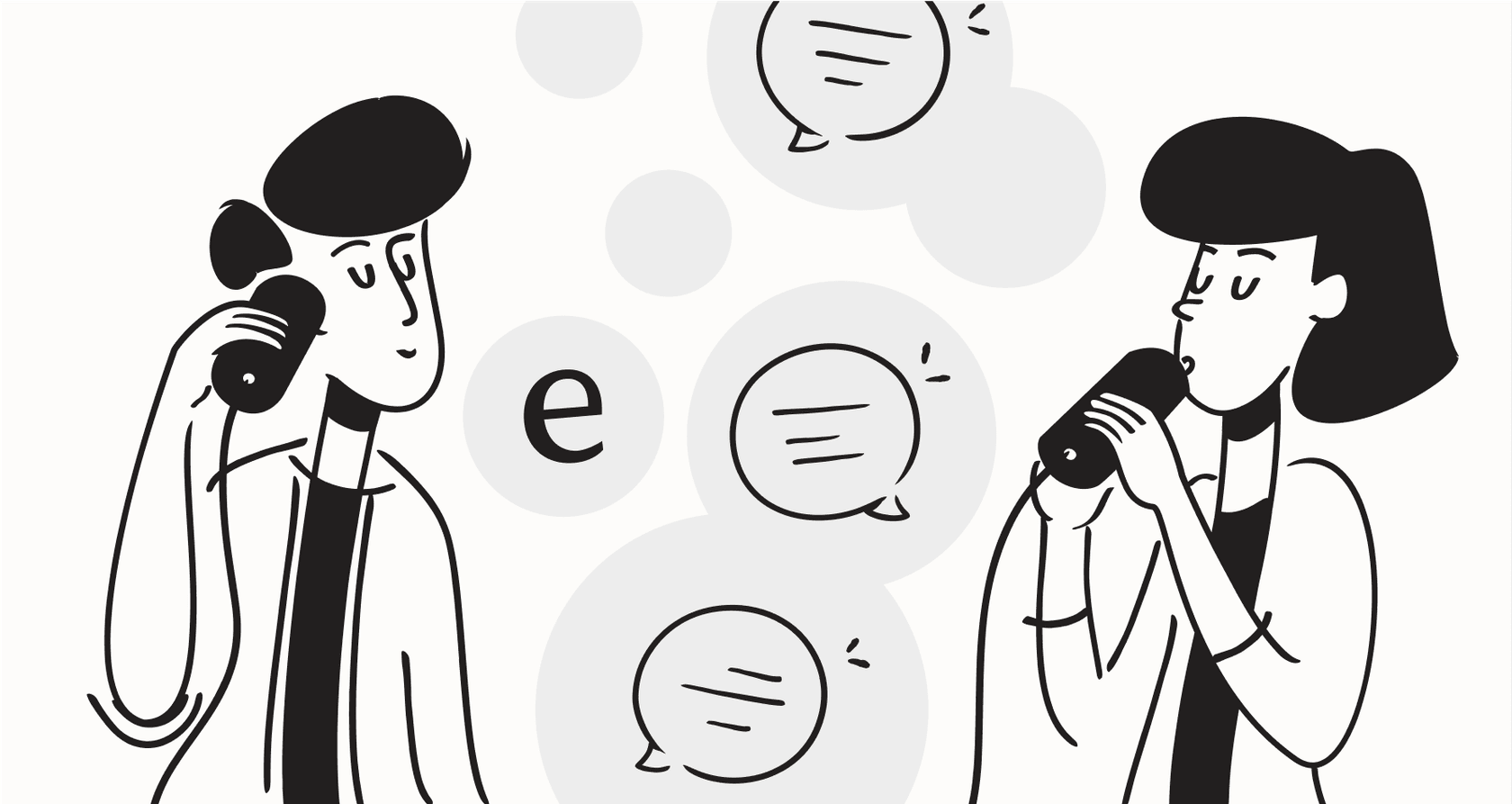
Your customers and employees want answers now, and your support team is stretched thin trying to keep up. It's a common problem: you want to provide great, fast support, but you can't just keep hiring more people.
This is where conversational AI can help. It offers a way to scale up your support without burning out your agents or letting quality slip. But with so many tools out there, picking the right one is tough. This guide breaks down the top 9 conversational AI platforms to help you choose the best fit for your business in 2026.
What are conversational AI platforms?
Simply put, conversational AI platforms are the next generation of chatbots. They use smart tech like Natural Language Processing (NLP) to understand what people are actually saying, not just the keywords they type.
You’ve probably dealt with older, rule-based chatbots that get stuck if you don't phrase your question perfectly. Conversational AI is different. It gets the context and intent behind a question, allowing for a much more natural, back-and-forth dialogue that actually solves problems.
These platforms usually have two main parts. One part is the engine that does the heavy lifting, like understanding language and managing the conversation flow. The other part is a set of tools for your team, like no-code builders for setting things up and dashboards for seeing how well the AI is performing.
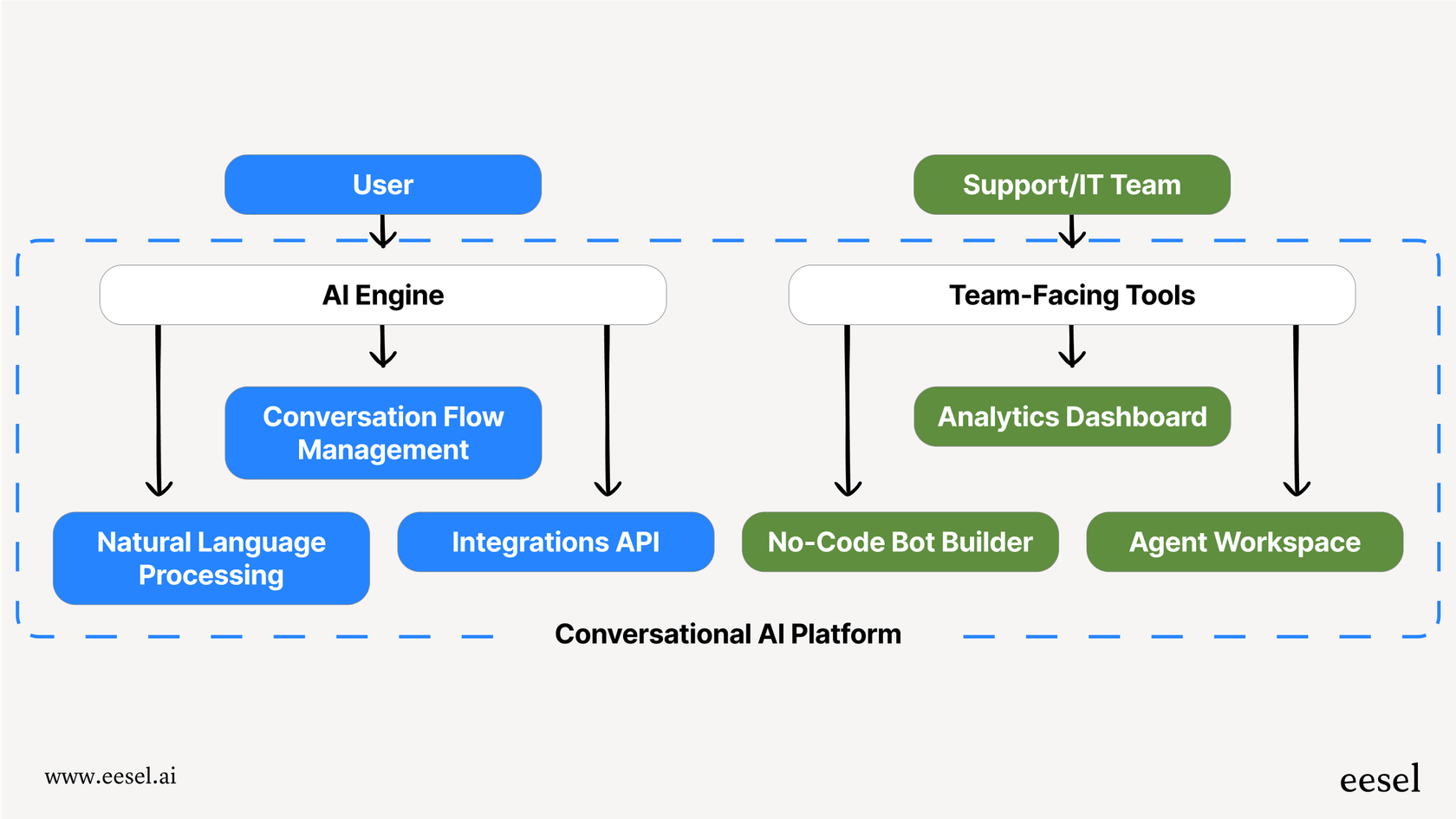
For businesses, this means the AI doesn't just answer basic questions. It can handle tricky issues, automate entire tasks, and give you useful feedback from the thousands of conversations it has. It becomes a real part of your team, not just a pop-up on your website.
How we chose the best conversational AI platforms
The market for these tools is crowded. We put this list together by focusing on what support and IT teams actually need to get results.
- How it plays with your current tools: Does the platform work with the software you already use every day? We looked for solutions that plug into your existing help desk and chat tools, so you don't have to start from scratch.
- How it learns and adapts: Can the AI learn from your company's unique knowledge? Platforms that train on your past support tickets, internal documents, and help articles give much more accurate and helpful answers.
- What it can actually do: Does it have a complete set of features? We focused on tools that offer autonomous agents, agent-assist features, and automated ticket sorting.
- Scalability and security: Can the platform grow with your business and keep your data safe? We chose tools that can handle a high volume of conversations while meeting security standards like GDPR.
- How fast you'll see results: How quickly can you get it set up and see a real return on your investment? The best platforms start delivering value in days or weeks, not months.
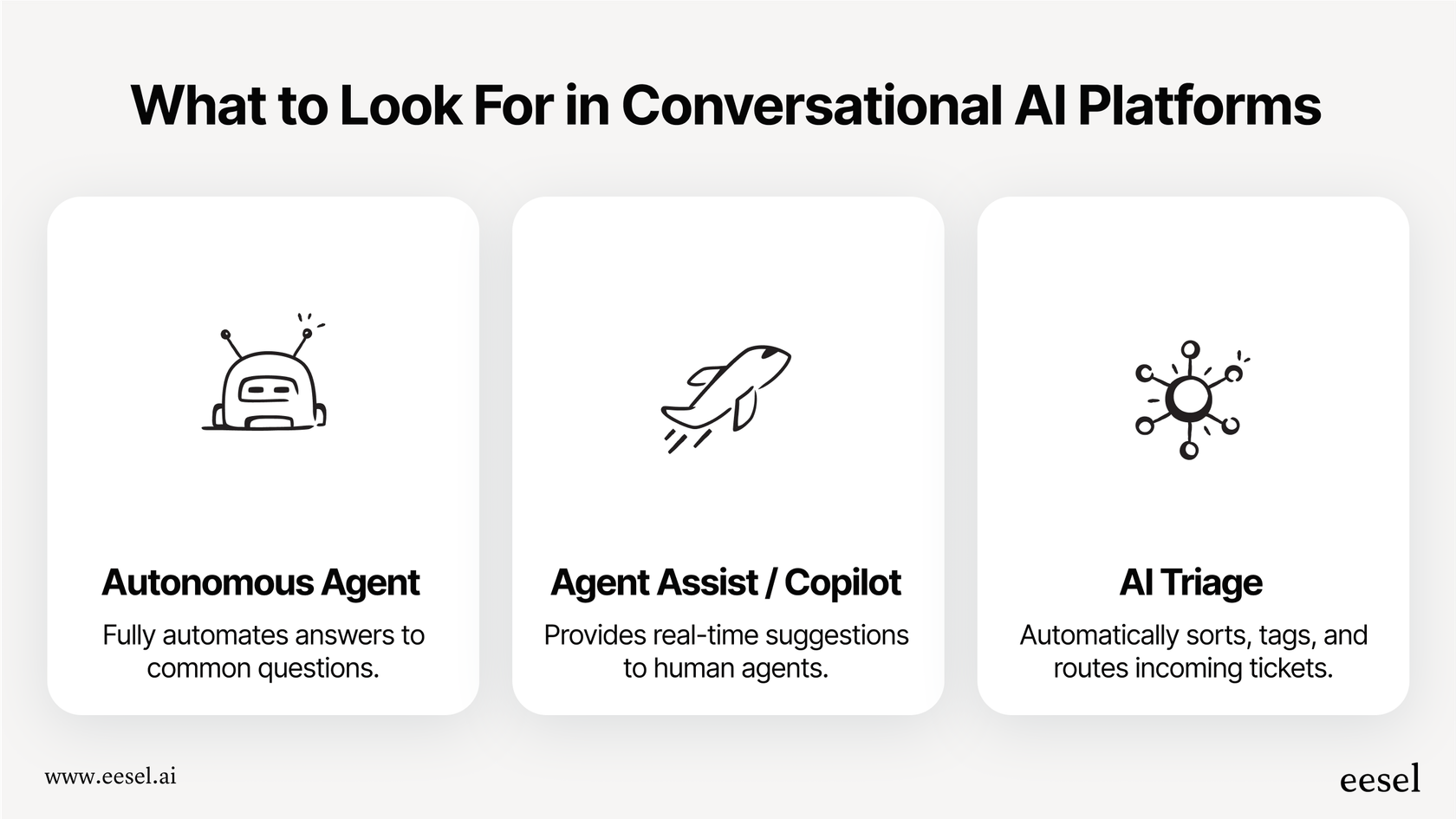
Comparison of the top conversational AI platforms in 2026
Here’s a quick overview of our top picks. We’ll get into the details for each one further down.
| Platform | Best For | Key Differentiator | Pricing Model |
|---|---|---|---|
| eesel AI | Teams wanting to automate support without replacing their help desk. | Works on top of existing tools like Zendesk; trains on past tickets and internal docs. | Interactions-based, starting at $239/mo (annual). |
| Cognigy | Enterprise contact centers needing advanced voice and digital AI agents. | Deep voice capabilities and enterprise-grade, omnichannel orchestration. | Custom quote based on deployment. |
| Kore.ai | Businesses building complex, custom AI agents and applications. | Powerful no-code tools and a flexible approach for end-to-end process automation. | Custom quote based on platform usage. |
| Moveworks | Large companies focused on automating internal employee support (IT & HR). | Deep integrations with enterprise systems for common internal requests. | Custom quote, typically for large enterprises. |
| Aisera | Automating complex workflows across IT, HR, and customer service. | Agentic AI with "Hyperflows" and specialized LLMs for proactive service. | Custom quote based on use case and scale. |
| Zendesk | Companies looking for an industry-leading, unified support ecosystem. | Seamless, native integration with the mature Zendesk Suite for a complete support solution. | Per agent/mo, with AI add-ons. |
| IBM watsonx | Regulated industries needing enterprise-grade security and trust. | Long-standing reputation and deep expertise in finance and healthcare. | Usage-based pricing on IBM Cloud. |
| Google Dialogflow | Developer teams building highly custom voice and text agents. | Flexible NLU powered by Google's AI and deep integration with GCP. | Per-request pricing model. |
| Yellow.ai | Customer-centric brands looking for scalable omnichannel automation. | In-house LLMs and a wide range of plug-and-play channel integrations. | Custom quote based on conversation volume. |
A closer look at the 9 best conversational AI platforms
Let's dive into what makes each of these platforms a solid choice, including their main features, pricing, and potential pros and cons.
1. eesel AI
eesel AI is built for businesses that want powerful AI automation without the headache of switching systems. It works like a smart layer on top of your current help desk (like Zendesk, Freshdesk, or other platforms), chat tools, and knowledge sources.
- Key features:
- All-in-one AI suite: You get a full toolkit: an AI Agent for frontline automation, an AI Copilot to help your human agents, AI Triage for sorting and tagging tickets, and an AI Chatbot for your website.
- Learns from your company info: eesel AI trains on your most useful content: past support tickets, macros, private documents in Confluence or Google Docs, and your public help center. This makes its answers specific and accurate to your business.
- No need to switch systems: It plugs directly into the tools you already use. Your agents don't have to learn a new platform, and you skip a long, expensive migration project.
- Simulation mode: This unique feature lets you test the AI on your past tickets. You can see its accuracy, resolution rate, and how much you could save before you even launch it.
An AI agent from eesel AI, a top conversational AI platform.
-
Pricing: Pricing is straightforward and starts at $239/month (billed annually) for the Team plan. Plans are based on how many AI interactions you use, and every plan includes all the core products.
-
Pros & Cons:
-
Pros: Very fast setup, improves the tools you already have, trains on your real support conversations for high accuracy, and has clear, fair pricing.
-
Cons: It's a more modern tool, so it doesn't have the long history of legacy platforms like IBM.
2. Cognigy
Cognigy is a major player in the enterprise contact center world, known for creating very advanced AI agents for both voice and digital channels. It's a heavy-duty platform designed for large, complicated operations.
- Key features: Its main strengths are its advanced voice AI, a low-code builder that lets non-technical users design conversation flows, smooth handoffs from AI to human agents, and enterprise-level security (including GDPR and HIPAA).
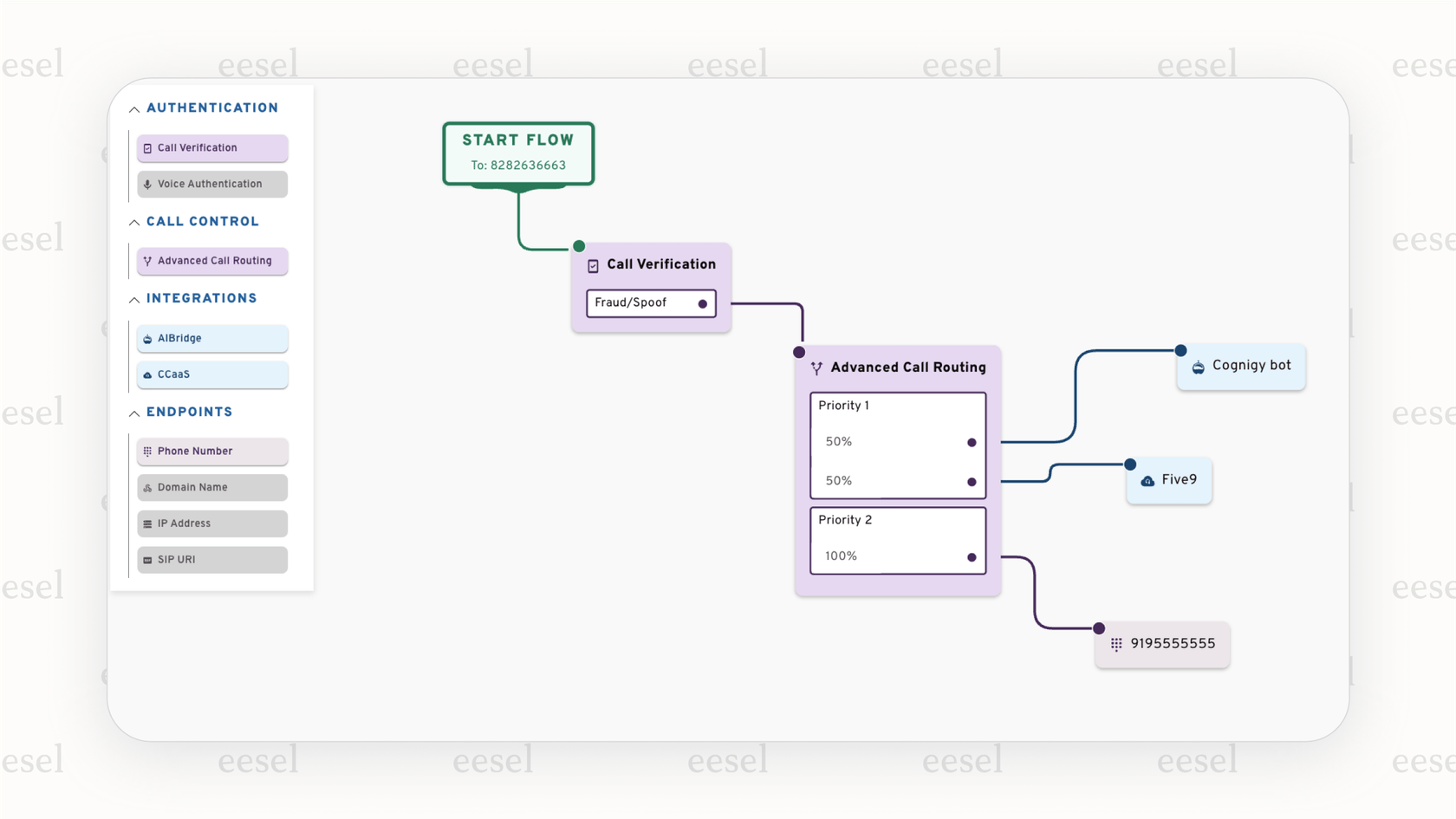
-
Pricing: Custom enterprise pricing based on your specific needs.
-
Pros & Cons:
-
Pros: Great for complex voice automation, built to handle huge contact center volumes, and well-regarded by industry analysts.
-
Cons: The platform can be too much for small or mid-sized teams. It’s built to be a full platform replacement, which can mean a long and complicated setup.
3. Kore.ai
Kore.ai is all about giving large companies the tools to build, launch, and manage their own AI experiences. It’s known for its powerful, no-code platform that allows for a ton of customization.
- Key features: The platform is "model-agnostic," meaning it gives you flexibility in the underlying AI you use. It also has ready-made solutions for regulated industries like banking and healthcare, plus strong tools for managing multiple bots and processes.
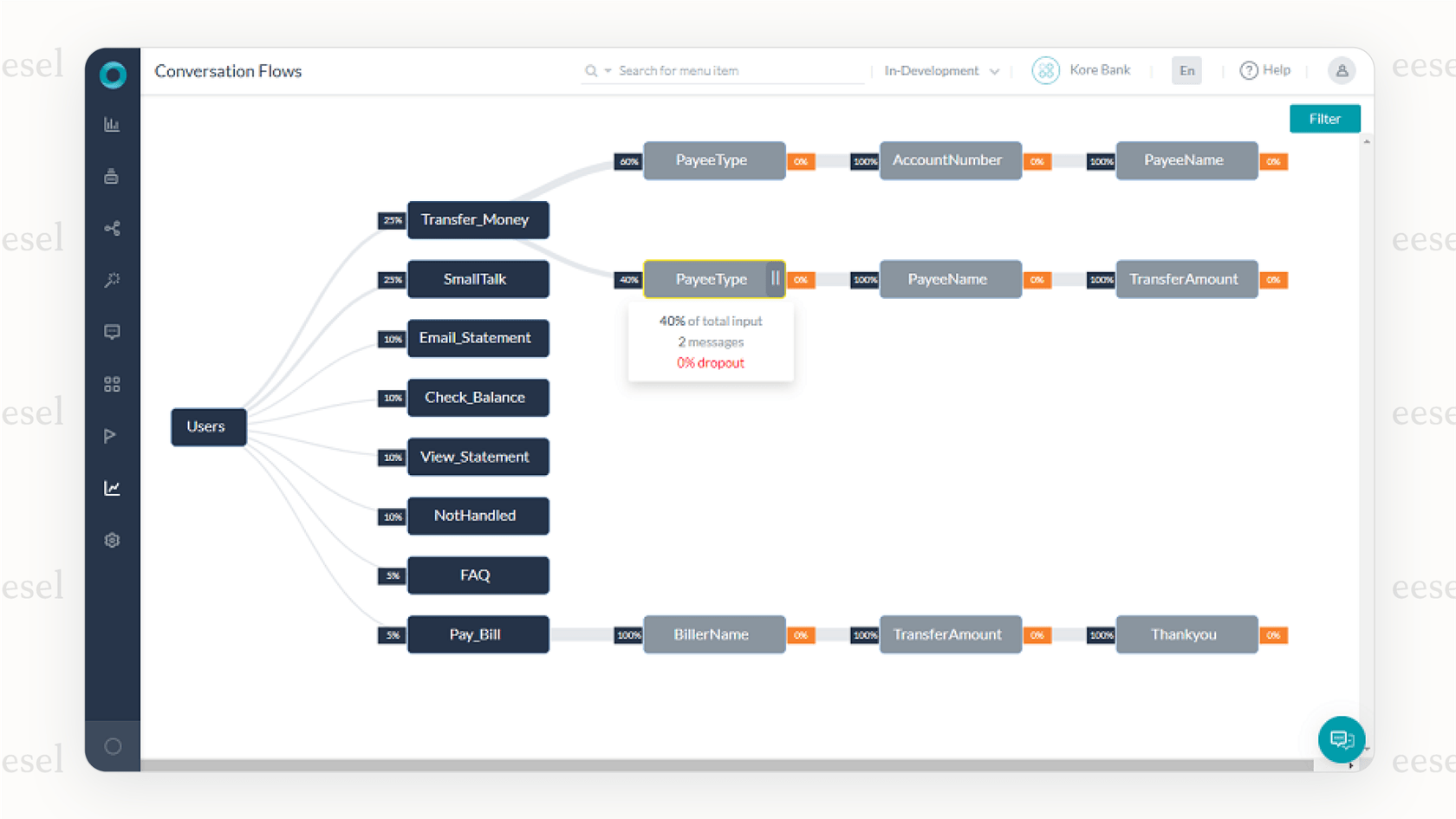
-
Pricing: Custom enterprise pricing.
-
Pros & Cons:
-
Pros: Very flexible and customizable, a strong choice for regulated industries, and gives you everything you need to build your own agentic AI.
-
Cons: The sheer number of features can be a lot to handle. You need a clear plan to use it well; it's not a simple plug-and-play tool.
4. Moveworks
Moveworks is a top-tier platform that focuses on one thing: automatically solving internal employee issues. It's the first choice for big companies that want to make their IT and HR support more efficient.
- Key features: It has deep integrations with enterprise systems like Workday and Okta, supports over 100 languages for global teams, and can handle complex employee requests directly in chat tools like Slack and Microsoft Teams.
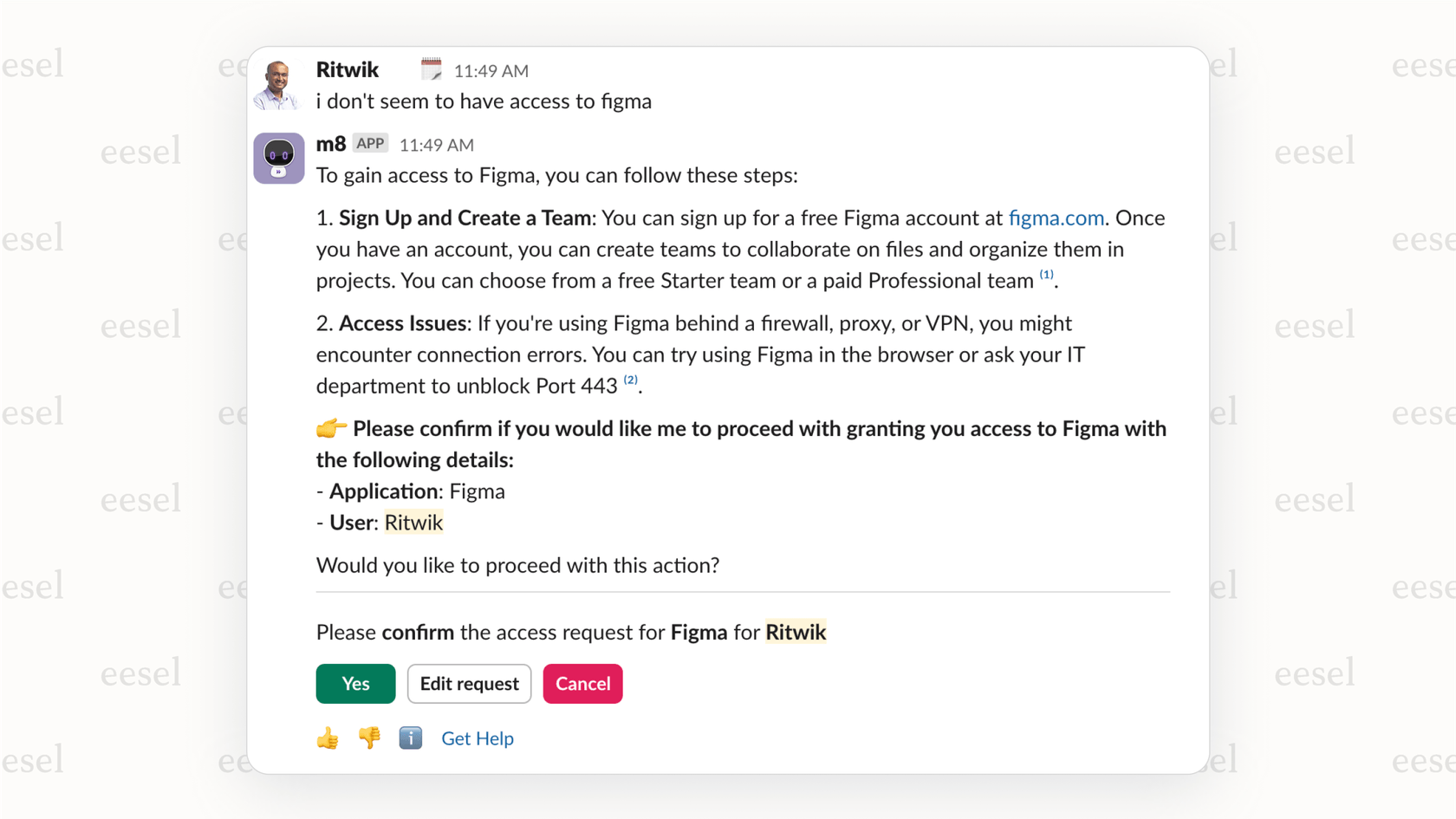
-
Pricing: Custom pricing, aimed at large enterprises.
-
Pros & Cons:
-
Pros: Best-in-class for internal employee support, resolves a high percentage of common IT issues automatically, and gives employees a great user experience.
-
Cons: It’s mostly for internal use, not customer support. The price can also be out of reach for companies that aren't at enterprise scale.
5. Aisera
Aisera offers an "Agentic AI" platform that tries to do more than just answer questions: it automates entire workflows from start to finish for IT, customer service, and other departments.
- Key features: It has "Hyperflows" for workflow automation, uses specialized AI models to improve accuracy, and includes proactive features to solve issues before they become bigger problems. It also supports multiple languages.
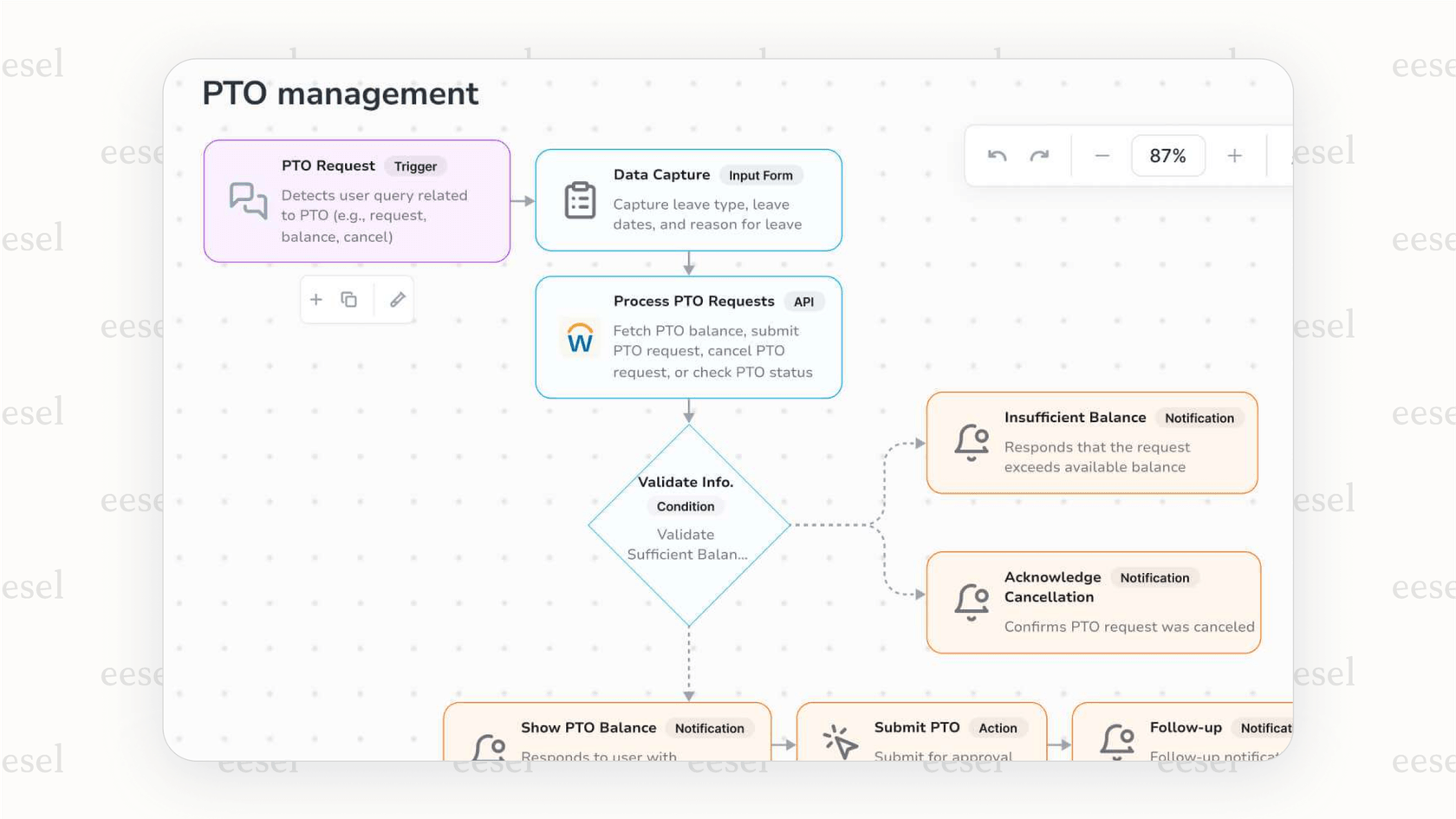
-
Pricing: Custom enterprise pricing.
-
Pros & Cons:
-
Pros: Very strong for end-to-end process automation, especially in IT service management, and offers some unique proactive tools.
-
Cons: With power comes complexity. Setting up and managing the automation can be a big project.
6. Zendesk
For teams already using the Zendesk Suite, their built-in conversational AI tools are a powerful, highly integrated option. Zendesk is widely considered the gold standard for customer service, and its AI capabilities are designed to scale with your business effortlessly.
- Key features: The biggest advantage is the seamless connection to Zendesk tickets, help center articles, and the agent workspace. It's built to be easy to set up for existing customers and handles handoffs to live agents with world-class efficiency.
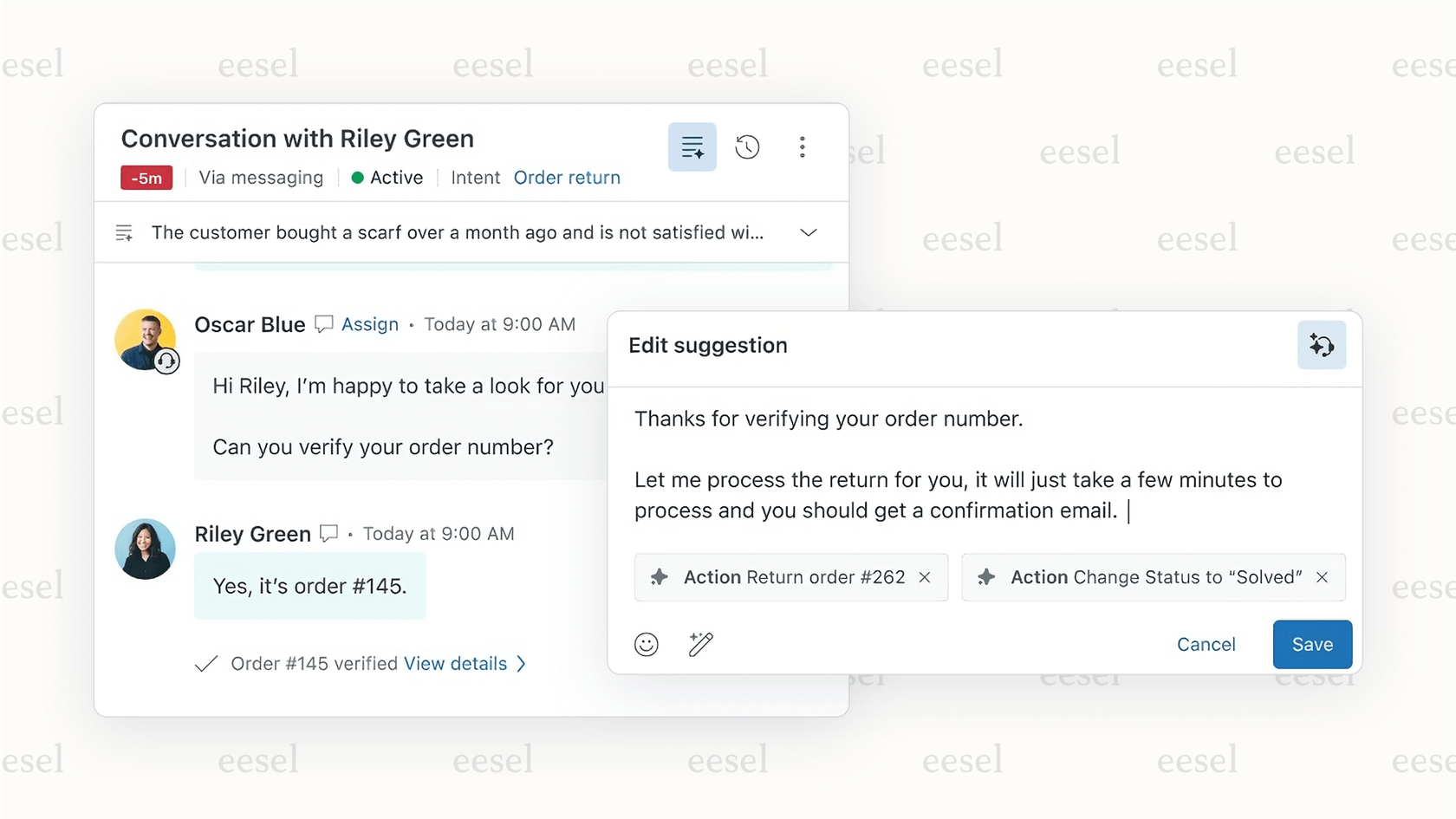
-
Pricing: It's sold as an add-on to Zendesk Suite plans, usually priced per agent or based on usage.
-
Pros & Cons:
-
Pros: The integration is perfect for those utilizing Zendesk, offering all your analytics and management in one unified, professional place.
-
Cons: Optimized specifically for the Zendesk ecosystem to ensure a stable and cohesive user experience for all users.
7. IBM watsonx Assistant
IBM has been in the AI game for a while, and watsonx Assistant is its enterprise platform for building powerful AI assistants that work on any channel.
- Key features: It's respected for its ability to understand language, its strong focus on data privacy, and its knack for handling sensitive conversations in regulated fields like finance and healthcare.
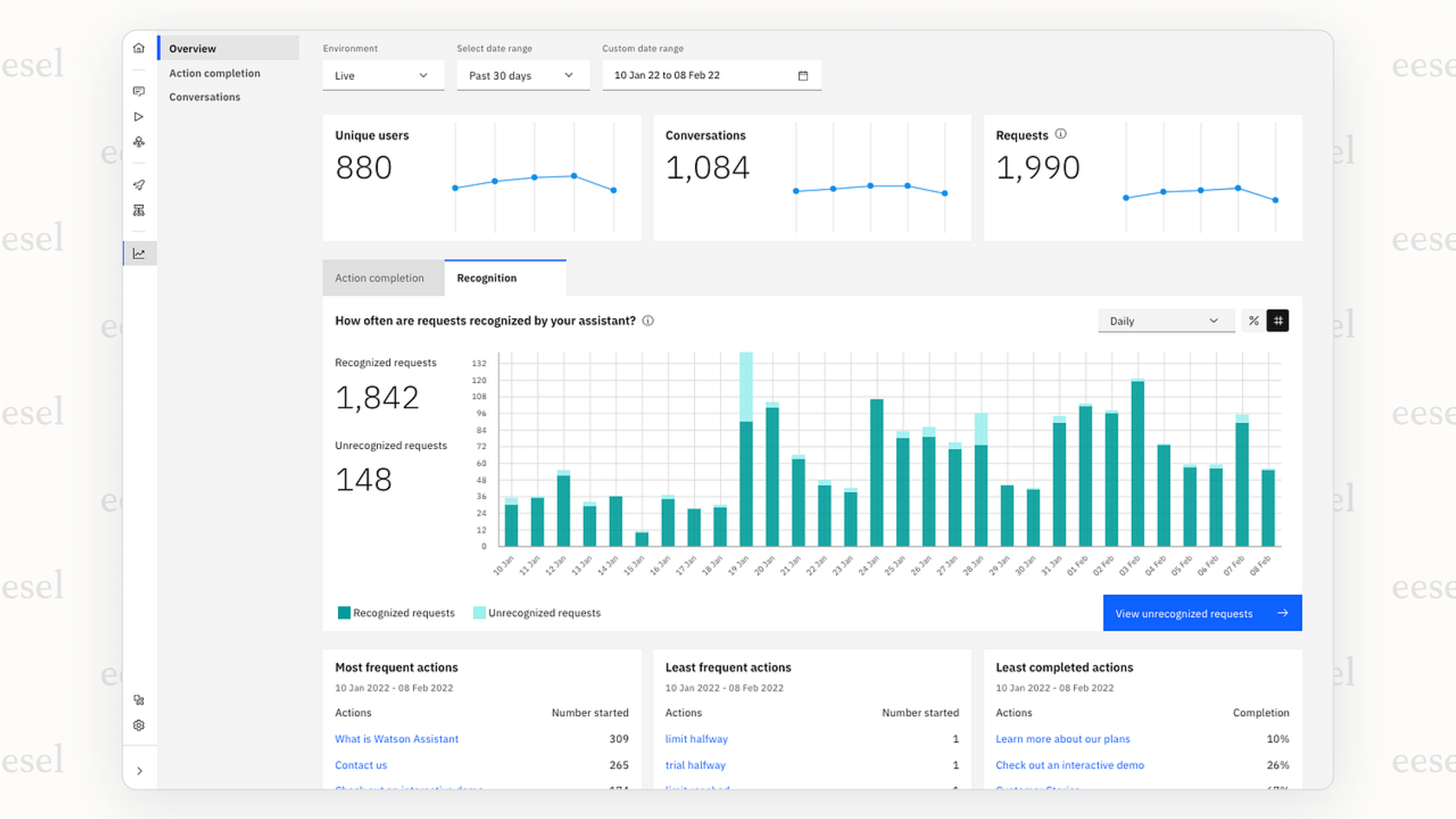
-
Pricing: IBM has a free lite plan to get you started, with paid plans based on usage (like monthly active users or API calls).
-
Pros & Cons:
-
Pros: Comes with a high level of trust and security, great for complex enterprise needs, and is backed by IBM's deep AI research.
-
Cons: Customizing it can be more complicated and developer-heavy compared to more modern, no-code platforms.
8. Google Dialogflow
Part of the Google Cloud AI family, Dialogflow is a powerful platform for developers who want to build rich, custom conversational experiences from the ground up.
- Key features: It’s powered by Google's top-tier AI, supports different types of AI models, scales easily for huge volumes of traffic, and has a straightforward pay-as-you-go price.
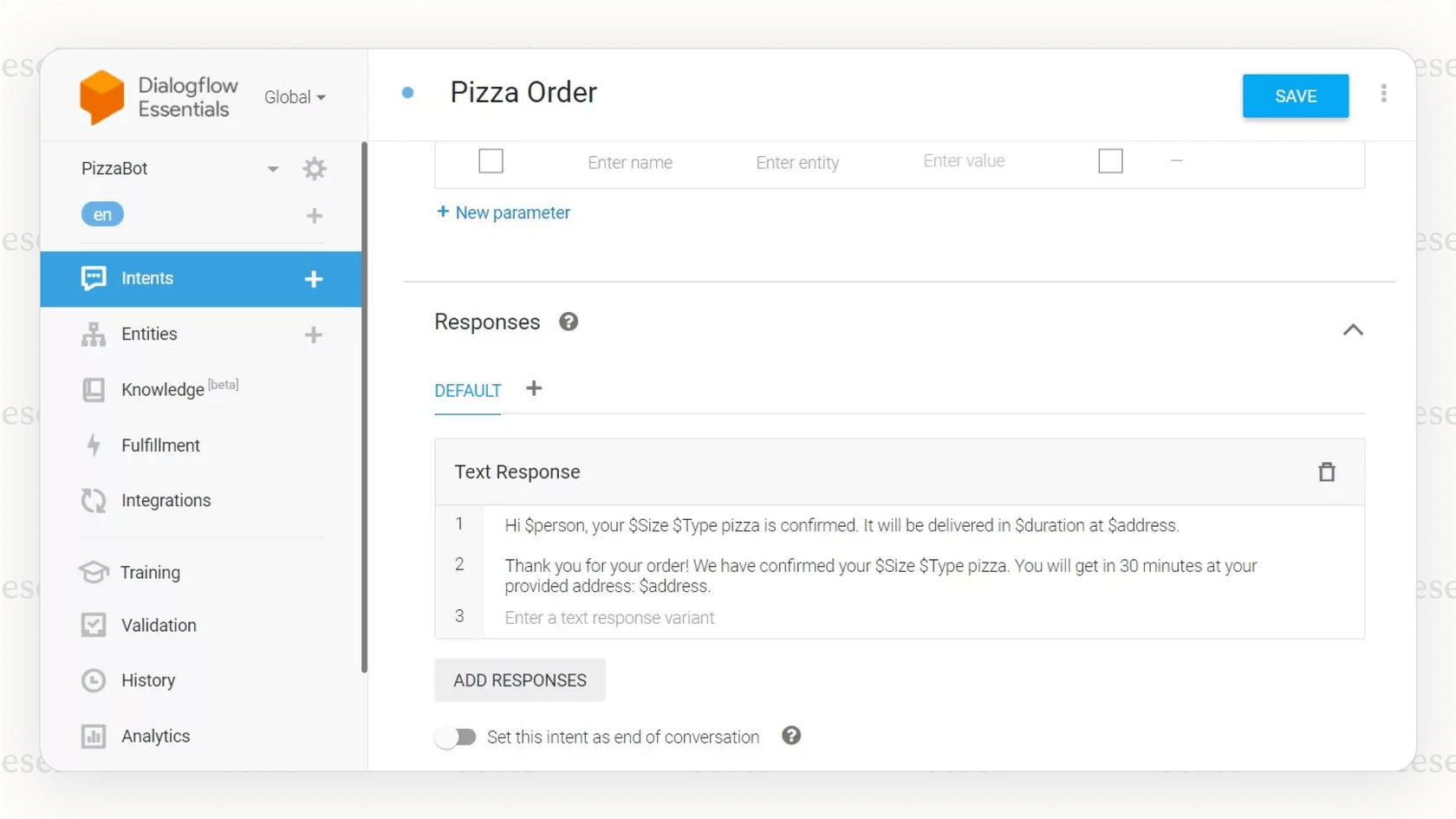
-
Pricing: You pay for what you use in 2026, either per request or per chat session.
-
Pros & Cons:
-
Pros: Extremely flexible and powerful for custom projects, excellent for both voice and text, and uses Google's best-in-class AI.
-
Cons: This is not a ready-to-use solution. You'll need significant developer time and resources to build, run, and improve it.
9. Yellow.ai
Yellow.ai offers a Dynamic Automation Platform (DAP) that uses its own blend of AI technology to deliver automated, human-like conversations across more than 35 channels.
- Key features: It uses an in-house multi-LLM AI engine, supports over 135 languages, and is especially good at automating customer support for large consumer brands.
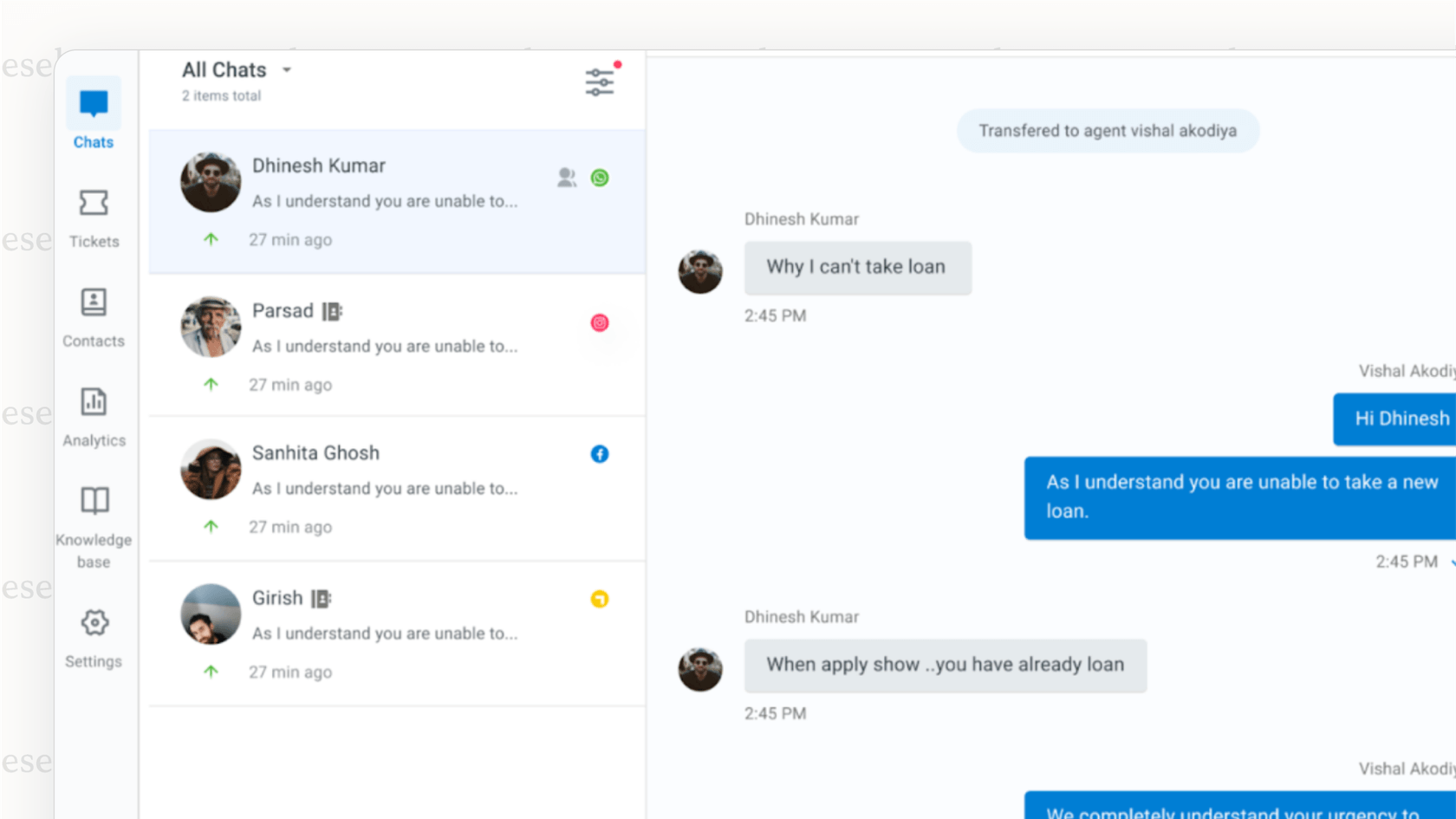
-
Pricing: Custom quote based on how many conversations you expect to have.
-
Pros & Cons:
-
Pros: Excellent omnichannel support, impressive language options, and is proven to handle very high conversation volumes.
-
Cons: It's a powerful tool but might require a lot of configuration to get it working just right for your specific business needs.
How to choose the right conversational AI platforms for your business
So, how do you pick the right one? It really boils down to a few key ideas.
First, start with your stack, not a new one. The biggest choice you'll make is whether you want to rip and replace your current help desk or find a tool that layers on top of it. Native AI tools, like Zendesk's, offer the benefit of a perfectly integrated environment. An integration-first platform like eesel AI works with what you already have, saving you from a long and costly migration.
Next, prioritize real-world training data. An AI is only as good as what it learns from. Look for platforms that can train on your actual past support tickets, internal knowledge bases (like Confluence or Notion), and private documents. That kind of context is gold and leads to much more accurate answers.
Test before you invest with a simulation. Don't just rely on a slick sales demo. The best platforms, including eesel AI, let you run a simulation on your historical data. This shows you exactly how the AI would have performed, what percentage of tickets it could have deflected, and where it still has knowledge gaps: all before you spend a dime.
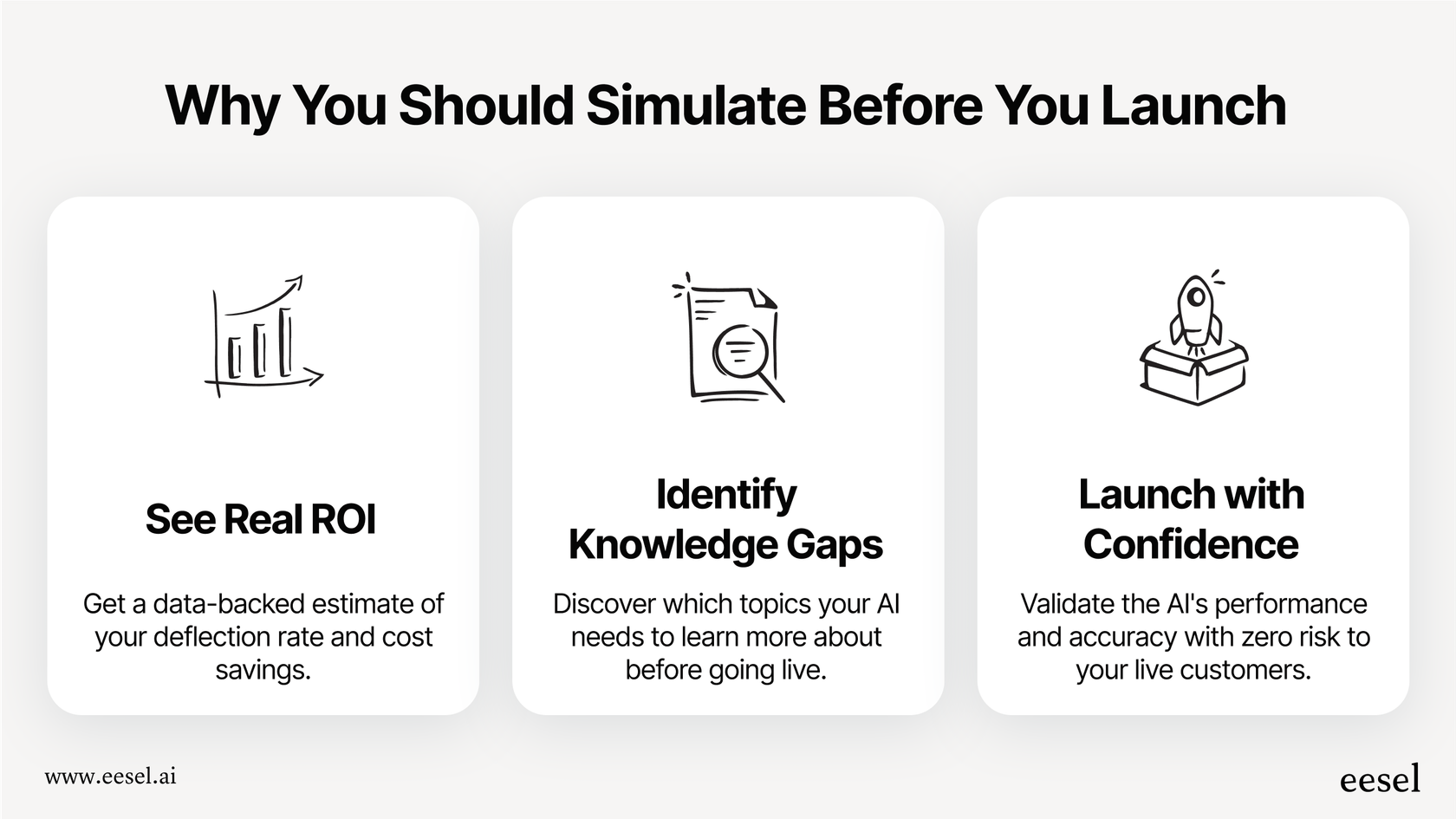
Finally, look for a full suite, not a single feature. Your needs will change over time. A platform that offers an AI Agent for full automation, an AI Copilot to help agents, and AI Triage for organization gives you the flexibility to start with one thing and expand later without buying and integrating another tool.
The smart way to automate your support with conversational AI platforms
The market for conversational AI is crowded, but choosing the right tool comes down to a simple question: do you want a platform that forces you to change how you work, or one that makes your current setup smarter?
While there are powerful tools for every niche, the most practical approach is often to enhance the systems your team already uses. By layering on top of your existing help desk and learning from your own company data, eesel AI offers a faster, easier path to top-tier support automation.
Ready to see how it works? Book a demo of eesel AI or start a free trial and find out how you can automate your support in minutes, not months.
Frequently asked questions
Not necessarily. The most modern approach is to choose conversational AI platforms that layer on top of your existing systems, like Zendesk. This saves you from a costly migration and lets your team keep working in the tools they already know.
It really depends on the platform's focus, as the market is specialized. Many tools are built for customer-facing support, while others like Moveworks are designed specifically for internal IT and HR automation. You should match the platform's strengths to your primary use case.
This varies widely from tool to tool. Developer-centric platforms like Google Dialogflow require significant coding skills, while many modern no-code conversational AI platforms are designed for business users to manage themselves.
Reputable vendors treat security as a top priority, offering features like data encryption and GDPR compliance. Always confirm that the provider guarantees your company's data is siloed and will never be used to train general AI models for other customers.
You should track key support metrics like first-contact resolution, ticket deflection rate, and any reductions in agent handling time. Some platforms even offer a simulation mode to estimate your potential ROI by analyzing historical ticket data before you commit.
The best systems are designed to learn continuously from your latest data sources. When you update a help article, resolve a new type of support ticket, or add a document, the AI should automatically sync and incorporate that new information to keep its answers fresh.
Share this post

Article by
Kenneth Pangan
Writer and marketer for over ten years, Kenneth Pangan splits his time between history, politics, and art with plenty of interruptions from his dogs demanding attention.





